New York’s Medical Marijuana Program Continues to Evolve

New York, whose medical-marijuana law is one of the most restrictive in the country, has been taking steps aimed at bettering its program. In March, the state New York, whose medical-marijuana law is one of the most restrictive in the country, has been taking steps aimed at bettering its program. In March, the state Department of Health added chronic pain as a qualifying condition. Less than five months later, the number of certified patients had increased by more than 40%, reaching 26,561 in early August.
Medical cannabis has been available to New York since 2016, when the five “registered organizations” began opening dispensaries. There are now 19 dispensaries for the state’s nearly 20 million residents. In August, the DOH announced it had approved five more organizations, saying it “ will improve patient access, product pricing and availability, and the geographic distribution of dispensing facilities across the state.” Each organization is licensed to operate one cultivation facility and four dispensaries.
Four of the five registered organizations had tried to stop the expansion. In a lawsuit filed in April, Etain Health, Med Men, PharmaCannis and Vireo Health argued that the number of patients was too low to support additional licensees. (Bloomfield Industries sold its license to California’s Med Men in February.) Etain contends that it alone has enough medical-cannabis products to serve the entire state market for 18 months. Those products are now available at Etain’s new retail location in Manhattan, which opened in July after they closed their Albany store.
The state legislature has passed a bill adding post-traumatic stress disorder as a qualifying condition, with the state Senate approving it by 50-13 on June 20. As of mid-August, Gov. Andrew Cuomo had not signed it, despite pressure from veterans groups.
New York’s medical law currently does not allow patients to receive marijuana, either as flowers for smoking or vaporizing or as edibles. The only products currently available are vape pens, tinctures, cannabis-extract oil and capsules filled with oil. On Aug. 10, the Department of Health announced that it would allow lotions, ointments, patches, and chewable tablets and lozenges. It also said it would shorten the training course required for doctors and nurse practitioners from four hours to two, let prospective patients enter a store without a doctor’s approval, and make it easier for ROs to advertise. Read the press release here.
If you enjoyed this Freedom Leaf article, subscribe to the magazine today!

